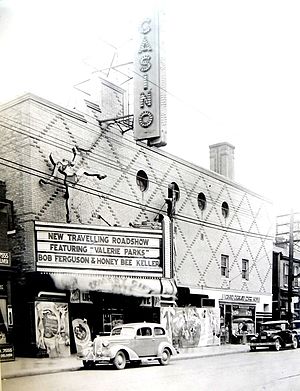Casino Theatre (Toronto): Difference between revisions
George Swan (talk | contribs) (trim metadata incompatible with this site) |
George Swan (talk | contribs) ({{subpages}}) |
||
| Line 1: | Line 1: | ||
{{subpages}} | |||
[[File:Casino Theatre in the 1940s - ttc-pc147.jpg|thumb|Casino Theatre in the 1940s]] | [[File:Casino Theatre in the 1940s - ttc-pc147.jpg|thumb|Casino Theatre in the 1940s]] | ||
The '''Casino Theatre''' was a live theatre, in [[Toronto]], [[Ontario]], Canada. It was located at 87 [[Queen Street (Toronto)|Queen Street West]] across the street from the current site of [[Nathan Phillips Square]].<ref name=SilentToronto1010/><ref name=SilentToronto1086/> | The '''Casino Theatre''' was a live theatre, in [[Toronto]], [[Ontario]], Canada. It was located at 87 [[Queen Street (Toronto)|Queen Street West]] across the street from the current site of [[Nathan Phillips Square]].<ref name=SilentToronto1010/><ref name=SilentToronto1086/> | ||
Revision as of 15:45, 29 August 2022
The Casino Theatre was a live theatre, in Toronto, Ontario, Canada. It was located at 87 Queen Street West across the street from the current site of Nathan Phillips Square.[1][2]
The structure was designed by architects Kaplan & Sprachman, who designed 21 other theatres in Toronto, and 48 elsewhere in Canada. The theatre opened in 1936 and demolished in 1960.[3][4] It seated almost 1,200 patrons.
The theatre hosted well-known performers, such as Johnny Rae, Patti Page, Gene Nelson, Pearl Bailey, Phil Silvers, Abbott and Costello, Nat King Cole, Sammy Davis Jr., Mickey Rooney, Frankie Laine, Sally Rand, Gypsy Rose Lee, Rose La Rose, Cup Cakes Cassidy, the Crewcuts, the Four Lads, Golden Gate Quartet, Billy Daniels and Rosemary Clooney.[5]
The strippers, and baudy comedians who performed at Casino made the Casino particularly subject to commentary and complaints.[3][6] Doug Taylor, the author of Toronto Theaters and the Golden Age of the Silver Screen wrote that, "Other perhaps than the Victory Theatre on Spadina, there is no entertainment venue that elicited as much praise, raunchy stories, condemnation and press coverage as the infamous Casino Theatre."[3] He described one high school principal staking out the theatre in order to catch students who were playing hookey to catch a show at the Casino.
Mike Filey, the Toronto Sun's historical columnist, noted that the theatre opened at one minute after midnight, April 13, 1936, a Monday, because conservative laws required the closure of venues that catered to pleasure, on Sundays.[3][6] Filey suggested public complaints about the morals of the establishment were routinely ignored, since it was right across the street from City Hall, and many city councilors were regular patrons. Filey wrote that the Casino "offered every type of performance allowed by law, and some that weren't."
The three partners who founded the Casino were Jules Allen, and Jay Allen, and Murray Little, who already owned the Broadway Theatre, another Burlesque theatre at 75 Queen Street West.[3]
References
- ↑ Eric Veillette. Toronto's Burlesque Legacy, Silent Toronto, 2010. Retrieved on 2016-02-29. “During the 1930s the south side of Queen St. between Bay and York St. had two burlesque houses: the Roxy and later, around 1936, the Casino theatre.”
- ↑ Eric Veillette. Latin American Revue at the Casino, Silent Toronto, 2010. Retrieved on 2016-02-29. “From the June 6, 1953 edition of the Toronto Telegram comes this tempting offer from the Casino Theatre at Queen & Bay: Latin-American chorus girls, the Marciano-Walcott fight and a Columbia cheapie about a school for sassy juvenile delinquents.”
- ↑ 3.0 3.1 3.2 3.3 3.4 Doug Taylor (2014). Toronto Theaters and the Golden Age of the Silver Screen. The History Press, 50, 52, 88–92, 102, 116. ISBN 9781626194502.
- ↑ Kaplan, Harold Solomon, Biographical Dictionary of Architects in Canada. Retrieved on 2016-02-29.
- ↑ Toronto theatres & music venues, World Theatres, 2016-02-22. Retrieved on 2016-02-29. “Casino Theatre – burlesque house at 87 Queen Street West of Bay – opened 1936 as The Vaudeville Theatre – 1121 seats – was burlesque house until 1948 and then starred top recording artists...”
- ↑ 6.0 6.1 Mike Filey (2015). Mike Filey's Toronto Sketches, Books 10–12. Dundurn Press. ISBN 9781459735453.
